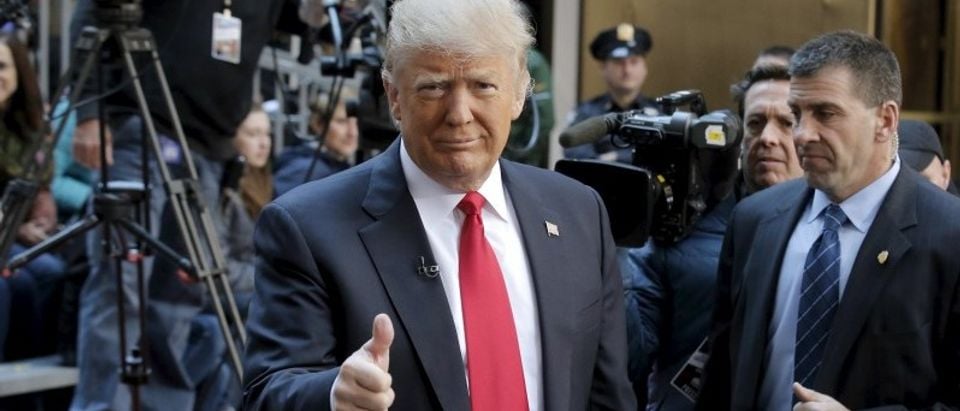Donald Trump is the presumptive nominee for the Republican Party.
That statement, an unbelievable joke a year ago, is now the reality driving Trump’s many conservative detractors to their wits’ end.
If anti-Trump conservatives are left with a candidate they can’t stand, what should they do? The answer seems to be that this election serves as a trial for conservatives. Trump is a lesson for the Right and exposes its deepest problems.
No, not that the conservative movement has become woefully out-of-touch with Republican voters. The problem, according to conservative thinking, is that conservatism has become too unpure and is in dire need of a purging.
My former Daily Caller colleague Alex Griswold wrote at Mediaite, a bit facetiously, that “Donald Trump is the greatest thing to happen to conservatism.” How so? Because his candidacy has exposed all the “frauds” and “charlatans” who have infested the principled halls of conservatism.
Believing that folks like Ann Coulter only espouse their views because it helps pay for “Manhattan high-rise apartment[s],” Griswold says those conservatives who support Trump are frauds looking to ride the tiger to more fortune and fame.
“Trump is the greatest thing to happen to conservatism because he is the cleansing forest fire, the Great Flood, the calamity we need… every conservative bottom-feeder has shoved themselves in Trump’s clown car and that car’s headed straight for a cliff,” he writes.
Griswold hopes that once the “disaster” that is Trump has passed, the GOP will come back stronger and more dedicated to the supposedly noble principles of conservatism.
Many writers besides Griswold have made similar points about Trump being a test of character, from moderates like David Brooks to true blue social conservatives like Erick Erickson. Many want to see the bright side in a Trump candidacy, hoping it all turns out okay and he’s nothing more than a temporary catastrophe. Coulter and her ilk are just backing Trump because they need money, or they’ve gone completely bonkers. (As an aside, the notion Coulter is an immigration restrictionist because it sells books is patently absurd. She’s a true believer, and has lost many previous fans due to her stance.)
The thrust of these arguments is that Trump poses no real threat to the legitimacy of conservatism. Movement conservatism will come back only stronger and purer after the Trump insurgency and all his campaign amounts to is rank fraud.
Unfortunately for these pundits, there is more to the Trump phenomenon than a revival of P.T. Barnum in political form. For decades, movement conservatism has assumed the sole voice of the American political Right. Its fusionist genesis — as in the merging of libertarian, traditionalist and foreign policy hawk strands — is as perfect as it was when it was first formulated in the 1950s. The alleged problem is that the movement doesn’t stand up for its principles enough and allows talk radio and other media to determine its tone.
The real problem, however, is that the movement can no longer provide a voice for the voters. Its rhetoric is virtually the same as it was in the 1980s, and many of its principles aren’t shared by the voters. Most Republicans aren’t busy worshiping at the altar of James Madison and fretting about the evils of the Export-Import Bank. They’re defined more by “conservative” sentiments than conservative tenets — a desire for order, a respect for tradition, a love of country. (RELATED: ‘Natural Conservatives’ May Be Too Much For The GOP Establishment)
As evidenced by the Republican primary and the candidates who rose to the top, there’s a deep unease among the GOP electorate with the path America is going down. Changing demographics, an economy in flux, and a radically transformed culture has left many Americans feeling that they are strangers in their own land.
Trump has tapped into a primal feeling among the Republican electorate that conservatives have willingly chosen to ignore. Large swaths of the population don’t see a rainbows and sunshine future over the horizon, and The Donald’s dark message has found an attentive audience. His authoritarian stylings is less a detriment to his fans than a positive; when the tribe feels threatened, the people clamor for a strongman.
Conservatives can decry the “fascism” and “demagoguery” of Trump all they want, but they need to understand why someone like that can run off with their party. Of course, the businessman’s brilliant showmanship and ability to entertain is part of his appeal. No one disputes that. However, there is more than that just entertainment value and aimless rage to Trump’s campaign.
Trump signals an ideological threat to conservatism. Call it populist-nationalism, call it Trumpism, call it what you like. There’s something out there that’s showing establishment conservatism no longer holds sway with crucial voting blocks.
The hope that everything will return to the good old days and the voters casting their ballots will embrace the Paul Ryan vision of the future down the road is wishful thinking.
Going into this election, the consensus among many Republican consultants and conservative pundits was that the Republican nominee needed to articulate a super-duper, all-inclusive message that America was on the verge of its best days ever. No talk about immigration, little mention given to social issues; just fiscal responsibility and the promise that everyone would reach the American Dream.
Marco Rubio, Jeb Bush, Rick Perry and a few others took up that mantle during the primary — and failed. A primary that crowned Trump a winner is a stark rebuke of conservative orthodoxy. Keeping conservatism alive in the future requires more than deluding yourself into believing you just need to get rid of the “fraudsters” who backed Trump.
It demands a reckoning with the voters and the acknowledgement conservatism needs a serious reform.


